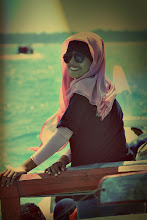 |
The history of Ratu Boko is unclear, and much of what is understood about the site comes from inscriptions and even folklore.
The oldest inscription found on the site is believed to date back to 792AD, naming the site Abhayagiri Wihara.
| ||||
| ||||
the name of the site changed to Walaing Kraton, Kraton being
palace in the local language, in an inscription known as the Mandyasih inscription.. this change of name was made by Rakai Kumbhayoni who is recognised as a king, and ruled from 856-863AD. during the 17th Century, a dutch man H.J.DeGraff noted that europeans coming to Indonesia had reported a heritage site, and referred to it being the palace of Prabu Boko, a king who came originally from Bali. this is the Prabu Boko of the Roro Djonggrang folklore. A mix of Buddhist and Hindu structures are found on the complex, including the Buddhist Dyani Budha, Stupika, Terakota Tablet, and a gold and silver plaque
with a Buddhist inscription. three small Hindu temples, as well as Yoni,
a Durga statue, a Ganesha statue and a plaque with an inscription to Rudra, the other name for the god Siwa.
EVENT ~(˘▾˘)~
1. Sumunaring Abhyagiri
Hundreds of performers tell the tale of the adventures of two princely
brothers, and their interactions with the local Boko community. the innate Javanese wisdom of the elders shines throughout, and the concept understanding one’s natural place in the world is explored.
Developed in conjunction with the State University of Yogyakarta’s
department of dance, this is a truly modern,and youthful spectacular. it maintains the traditional values of Javanese dance, including expressing moral principles as a way of education. Ticket prices are as follows:Platinum Class Seating IDR 500.000Gold Class Seating IDR 400.000Silver Class Seating IDR 300.000Festival Class Seating IDR 200.000 | |







0 komentar:
Posting Komentar